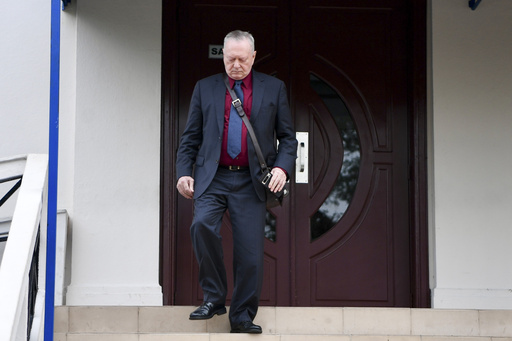PANAMA CITY (AP) — Eight years after 11 million leaked secret financial documents revealed how some of the world’s richest people hide their wealth, more than two dozen defendants are on trial in Panama for their alleged roles.
The repercussions of the leaks were far-ranging, prompting the resignation of the prime minister of Iceland and bringing scrutiny to the then-leaders of Argentina and Ukraine, Chinese politicians and Russian President Vladimir Putin, among others.
But those on trial now for alleged money laundering are principally the leaders and associates of the now defunct Panamanian boutique law firm that helped set up the shell companies used to obscure those really behind them.
The leaders of that firm, Jürgen Mossack and Ramón Fonseca, are among those on trial.
WHAT IS THE PANAMA PAPERS CASE ABOUT?
Panamanian prosecutors allege that Mossack, Fonseca and their associates created a web of offshore companies that used complex transactions to hide money linked to illicit activities in the “car wash” corruption scandal of Brazilian construction giant Odebrecht.
In December 2016, Odebrecht pleaded guilty in U.S. federal court to a charge related to its use of shell companies to disguise hundreds of millions of dollars in bribes paid in countries around the world to win public contracts.
According to Panamanian prosecutors, the Mossack Fonseca firm created 44 shell companies, 31 of which opened accounts in Panama to hide money linked to the Brazilian scandal. The judge on the case, Baloisa Marquínez, last year decided to also merge the Odebrecht-related charges to prosecutors’ allegations about the firm’s work for German giant Siemens. Prosecutors allege a former executive with the company used entities created by Mossack Fonseca to transfer funds for bribes.
A Siemens spokesperson declined to comment, noting that it is not a party to the Panama case and that it involves former Siemens employees in their private capacity.
WHAT DO MOSSACK AND FONSECA SAY?
The 71-year-old Fonseca has not been present for the trial, because his lawyer said he is hospitalized. But he had previously said his firm did not control how their clients used the shell companies the firm created for them. Its role was simply the creation and sale of the companies.
Mossack, a 76-year-old lawyer originally from Germany, said in a statement to The Associated Press that “we categorically reject that we have committed any crime, not Mossack Fonseca nor the subsidiaries … and we hope that can be proved in the trial. If there is in fact justice in our case, they have to absolve us.”
Both men were arrested in 2017, but had awaited trial out on bond.
WHAT HAPPENED TO THE FIRM?
Mossack Fonseca helped create and sell around 240,000 shell companies across four decades in business. It announced its closure in March 2018, two years after the scandal erupted.
“The reputational deterioration, the media campaign, the financial siege and the irregular actions of some Panamanian authorities have caused irreparable damage, whose consequence is the complete cease of operations to the public,” the firm said in a statement at the time.
HOW DID THE SCANDAL AFFECT PANAMA?
Panama’s international reputation for financial services was tarnished by the scandal.
The European Union included Panama on a list of tax haven countries — low taxes or fiscal opacity — which led international financial institutions to demand the implementation of measures that would allow scrutiny of the banking and financial systems.
Consequently, the country’s business creating shell companies plummeted some 40% within a year of the scandal.
WHAT CHANGES DID PANAMA MAKE?
Panama’s government implemented changes to make it possible to identify the ultimate beneficiary behind limited liability companies and their assets.
Changes also sought to give greater responsibility to the registered agents — typically lawyers from Panamanian firms — listed for the shell companies.
The objective was to make it possible for Panamanian authorities to respond to requests to assist in investigations.
Julio Aguirre, an expert and financial specialist in Panama, said the government wants the registered agents to actually keep an eye on the companies. Before, “the law didn’t ask them to follow up, there wasn’t that legal obligation,” he said.
Banks had also previously been restricted in their ability to know who was really behind accounts. “They gave the bank the vehicle to obtain that information,” Aguirre said.
This website uses cookies so that we can provide you with the best user experience possible. Cookie information is stored in your browser and performs functions such as recognising you when you return to our website and helping our team to understand which sections of the website you find most interesting and useful.
